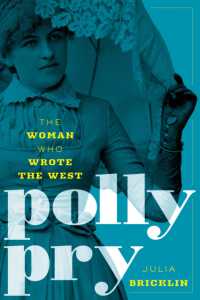- ホーム
- > 洋書
- > 英文書
- > Politics / International Relations
Full Description
Exploring the tension between ideals and their practice, the authors focus on exemplary studies so that students gain a richer understanding of key findings and the research process as well as seeing methods applied in context.
Contents
Part IChapter 1: Public Opinion in a DemocracyTheories of DemocracyWhat Is Public Opinion?Defining Key ConceptsEmpirical Assessments of Public OpinionThemes of the BookKey ConceptsSuggested Sources for Further ReadingAppendix: Studying Public Opinion EmpiricallyPublic Opinion SurveysExperimentsInterviewsFocus GroupsContent AnalysisConclusionKey ConceptsSuggested Sources for Further ReadingPart II: Are Citizens Pliable?Chapter 2: Political SocializationChildhood SocializationParental Transmission of Political AttitudesGenerational and Period EffectsGenetic Inheritance of Political AttitudesConclusionKey ConceptsSuggested Sources for Further ReadingChapter 3: Mass MediaWhat Should Citizens Expect from the Mass Media in a Democracy?What General Characteristics of the Mass Media Shape News Coverage?What Specific Characteristics of the Traditional News Media Shape the Reporting of Political Events?Are Citizens Affected by the Mass Media?Media Effects in a Changing Technological EnvironmentConclusionKey ConceptsSuggested Sources for Further ReadingChapter 4: Attitude Stability and Attitude ChangeAre Americans' Attitudes Stable?Presidential ApprovalPsychological Approaches to AttitudesConclusionKey ConceptsSuggested Sources for Further ReadingPart III: Do Citizens Organize Their Political Thinking?Chapter 5: Ideology, Partisanship, and PolarizationConverse's Claim: Ideological InnocenceIdeological IdentificationParty IdentificationPolarizationConclusionKey ConceptsSuggested Sources for Further ReadingChapter 6: Pluralistic Roots of Public Opinion: Personality, Self-Interest, Values, and HistoryPersonalitySelf-InterestValuesHistorical EventsConclusionKey ConceptsSuggested Sources for Further ReadingChapter 7: Pluralistic Roots of Public Opinion: The Central Role of GroupsRace and Public OpinionGender and Public OpinionConclusionKey ConceptsSuggested Sources for Further ReadingPart IV: Do Citizens Endorse and Demonstrate Democratic Basics?Chapter 8: Knowledge, Interest, and Attention to PoliticsHow Knowledgeable, Interested, and Attentive Should Citizens Be in a Democracy?Are Citizens Knowledgeable about Politics?Measuring Political KnowledgeWhy Are Some Citizens More Knowledgeable than Others?What Are the Consequences of Political Knowledge?Are Citizens Interested in and Attentive to Politics?ConclusionKey ConceptsSuggested Sources for Further ReadingChapter 9: Support for Civil LibertiesAre Americans Tolerant?Sources of Tolerant AttitudesContextual Influences on Tolerance JudgmentsAre Elites More Tolerant?Civil Liberties Post-9/11ConclusionKey ConceptsSuggested Sources for Further ReadingChapter 10: Support for Civil RightsPublic Opinion and Presidential CandidatesSupport for Civil Rights PoliciesConclusionKey ConceptsSuggested Sources for Further ReadingPart V: What Is the Relationship between Citizens and Their Government?Chapter 11: Trust in Government, Support for Institutions, and Social CapitalTrust in GovernmentSupport for InstitutionsSocial CapitalConclusionKey ConceptsSuggested Sources for Further ReadingChapter 12: Impact of Public Opinion on PolicyShould Public Opinion Influence Policy?Is Public Opinion Related to Policy?Do Politicians Follow or Lead the Public?Public Opinion and Foreign PolicyConclusionKey ConceptsSuggested Sources for Further ReadingPart VI: What Do We Make of Public Opinion in a Democracy?Chapter 13: ConclusionWhat Should the Role of Citizens Be in a Democratic Society?Are Citizens Pliable?Do Citizens Organize Their Political Thinking?Do Citizens Endorse and Demonstrate Democratic Basics?What Is the Relationship between Citizens and Their Government?What Do We Make of Public Opinion in a Democracy?








